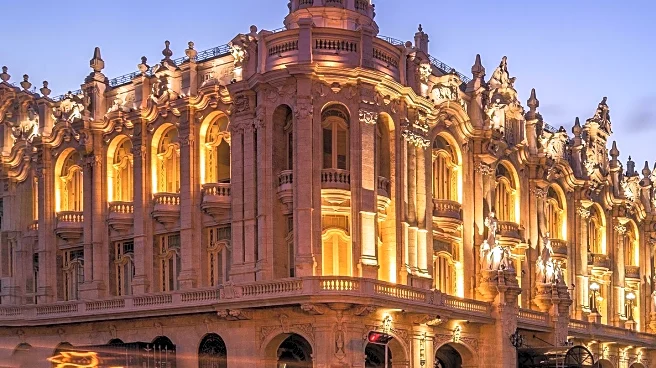What's Happening?
Sandro Castro, the grandson of Fidel Castro, is facing criticism for his behavior as an influencer, which many see as contrary to the ideals of the Cuban Revolution. Sandro has been posting images and videos on Instagram showcasing his luxurious lifestyle, including scenes with expensive cars and parties, while Cuba faces significant economic challenges. His actions have drawn ire from Fidel Castro loyalists and critics alike, who argue that Sandro's displays of wealth are disrespectful to the legacy of his grandfather, Fidel Castro, who led Cuba under communist ideals. Sandro's posts have included mocking the country's economic struggles, such as a deleted post about a lack of chicken for a recipe, and celebrating his birthday during a national blackout.
Why It's Important?
The criticism of Sandro Castro highlights the tension between the younger generation of Cuba's elite and the country's ongoing economic hardships. As Cuba faces its largest mass exodus since the 1970s, the actions of Sandro Castro could exacerbate the legitimacy crisis of the communist regime. His behavior is seen as a departure from the revolutionary ideals that his grandfather championed, potentially undermining the regime's image and stability. This situation reflects broader societal issues in Cuba, where the disparity between the ruling elite and the general population's living conditions is stark.
What's Next?
The backlash against Sandro Castro may lead to increased scrutiny of the lifestyles of Cuba's elite, potentially prompting calls for reform or change within the country's political structure. As the economic situation in Cuba worsens, the government may face pressure to address these disparities and the public's dissatisfaction. The criticism could also influence Sandro Castro to alter his public persona or approach to social media, although it remains to be seen how he will respond to the ongoing controversy.
Beyond the Headlines
Sandro Castro's actions raise questions about the ethical responsibilities of public figures, especially those connected to historical political movements. His behavior could spark discussions about the role of social media in shaping public perceptions and the impact of influencers on societal values. The situation also underscores the cultural shift within Cuba, as younger generations navigate the legacy of the revolution while facing modern economic realities.








